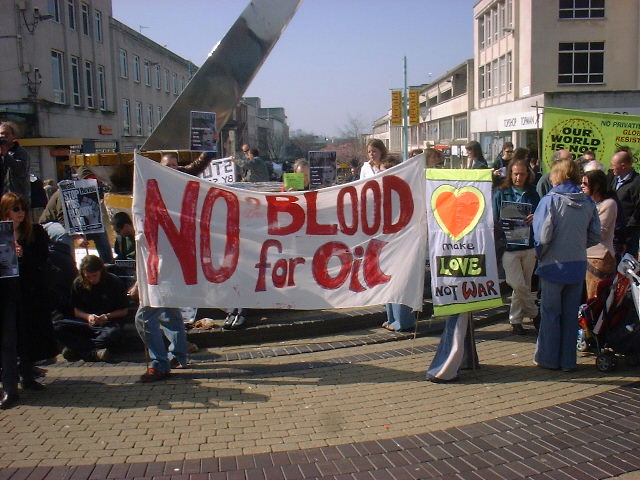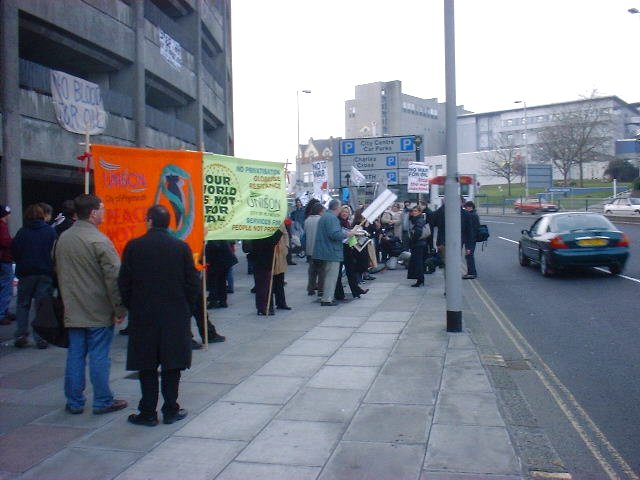I came back yesterday from a week spent in the UK with S—, which partially explains why I haven’t been blogging… Just too busy doing other stuff –and then Bush’s War finally started, so we became busier still with anti-war protests. Not to mention that I’ve just became depressed with the whole situation and wasn’t really in the mood to blog about it or anything else. See also my rant over at Prog Gold This post is sort of intended to be a catch-all catch-up on the war and all that surrounds us. Don’t expect too much coherence.
So yeah, we spent most of the week helping prepare various anti-war protests in Plymouth, as well as take part in them. For those of you who don’t know Plymouth, it’s a medium sized city (pop: approx. 250,000) in the South West of England and a navvy town of old. There’s a huge navy base and several of the ships and units participating in the war are Plymouth based, e.g. HMS Ocean and 3 Commando. As you may suspect, support for the war is fairly high in Plymouth, though certainly not universal. If anything, people are more apathic than anything else. (Something which seems to be true of Plymouth in general anyway. It’s a very inward looking and provincial town, mainly because it’s so isolated from the rest of Britain. It’s six hours away from London, two hours even from Bristol.)
Since we were both on leave and hence available, it fell to us to do all the really glamourous work needed, like photocopying a zillion different leaflets advertising the national demo last Saturday, calling for union members to strike against the war, etc, etc as well as be warm bodies for the lunchtime protests held in the city centre. A sort of working holiday, so to speak…

The lunchtime protests were fun, and the second, on Thursday, drew some 200 people, as well as plenty of media attention, including a spot on the local ITV news as well as various radio stations. I even got to speak to one of them.
There were also evening protests starting from Tuesday, taking place at the Charles Cross roundabout. During World War II Plymouth was heavily blitzed, even worse than London. After the war, the city council finished what the Germans started, the result being one those soulless 1960ties brutalist city centres. The only remainder of the German bombardments are the ruins of Charles Church, which is now in the middle of Charles Cross, turned into a sort of monument. An appropriate place to protest against war, in other words.

Doing all this, even if largely futile at least gives a sense of accomplishment. In between, when watching the ever worsening news on BBC or ITV or reading the newspaper was just depressing and angering me. What sickened me the most was not the news of massive bombardments going on in Bagdhad, it was that the reporter bringing it sounded so proud about it…
What also infuriated me was the “support our boys; stop protesting” drivel in every other editorial. It’s such a blatant ploy to stifle dissent. As if getting them killed is so supportive! Especially now criticism is important, as anybody with half a brain knows and if that undermines the moral of “our brave boys” in Iraq, why should we care when we believe they’re fighting an unjust war anyway? The best thing to support the troops is to bring them back home, not to keep them as target practise for bored Americans. (Cheap shot, I know.)
Then there was the stupidity of blaming France for causing this war, which is like blaming me for getting the Cheeky Girls to number one because I didn’t buy their record. there’s only one man to blame for this war and that is Bush, with Blair as his enabler.
Oh, and how about that Clare Short eh? Worst. U-turn. Ever.
Also getting on my tits: all the pious hopes for a “speedy end” to this war. Sure, I don’t particularly want to see a quagmire either, but I don’t think the semblance of a speedy victory (semblance, because I don’t think a speedy victory is actually possible would be a good thing. It would only encourage Bush into more disastrous adventures. So I am conflicted, neither wanting to see more death and destruction, but also wanting to see Bush getting a bloody nose.
In any case I feel sorry for any coalition troops being killed or wounded, but I feel more sorry for any Iraqi civilians or conscripts getting killed; the latter had no choice in this war.